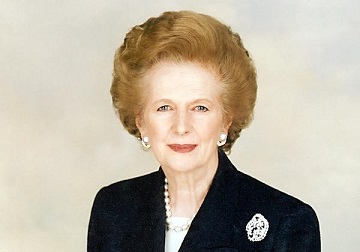Margaret Thatcher, Iron Lady and Climate Change Advocate

Former British Prime Minister Margaret Thatcher, the so-called Iron Lady who passed away on Monday April 8, was one of the first world leaders to draw attention to the potential perils of climate change, back in 1990. While acknowledging that the data were new and there were a lot of uncertainties, she said the issue had to be taken seriously.
“The danger of global warming is as yet unseen, but real enough for us to make changes and sacrifices, so that we do not live at the expense of future generations,” Thatcher said in her speech to the Second World Climate Conference, sponsored by the World Meteorological Organization, the United Nations Environment Programme and other international organizations in 1990. “Our ability to come together to stop or limit damage to the world’s environment will be perhaps the greatest test of how far we can act as a world community. No one should underestimate the imagination that will be required, nor the scientific effort, nor the unprecedented co-operation we shall have to show. We shall need statesmanship of a rare order. It’s because we know that, that we are here today.”
Much of her speech was prescient too, quoting predictions from the Intergovernmental Panel on Climate Change (IPCC) that are indeed coming to pass 13 years later.
“The IPCC tells us that, on present trends, the earth will warm up faster than at any time since the last ice age,” she said. “Weather patterns could change so that what is now wet would become dry, and what is now dry would become wet. Rising seas could threaten the livelihood of that substantial part of the world’s population which lives on or near coasts. The character and behavior of plants would change, some for the better, some for worse. Some species of animals and plants would migrate to different zones or disappear forever. Forests would die or move. And deserts would advance as green fields retreated.”
Moreover, she said, continuing to refer to findings in the IPCC report released at the Geneva conference, “Climate change may be less than predicted. But equally it may occur more quickly than the present computer models suggest. Should this happen it would be doubly disastrous were we to shirk the challenge now. I see the adoption of these policies as a sort of premium on insurance against fire, flood or other disaster. It may be cheaper or more cost-effective to take action now than to wait and find we have to pay much more later.”
Born in 1925, Thatcher was the daughter of a greengrocer. First elected to Parliament in 1959, the Tory Thatcher went on to serve as Prime Minister of Britain from 1979 to 1990. She died on Monday April 8 of a stroke at age 87.
Subsequent reports painted a slightly different picture on her attitudes toward climate change and her take on the global warming debate. The British newspaper the Guardian listed the 1990 and other speeches on climate change, but said that to dwell solely on those public pronouncements was to “greenwash” her stance on the issue. And according to Huffington Post, she backed off from those strong sentiments in later years.
“She would later recant many of her positions, however, adopting an increasingly skeptical stance,” Huffington Post reported in a piece titled “Margaret Thatcher’s Climate Change of Heart.” “Although some maintain that she was consistent in her advocacy for the environment, more than 10 years later, she publicly criticized the push to protect it.”
For instance, the story goes, she appeared to backtrack on some of the issues, or at least on the activists’ way of championing them, calling some of the climate change dialogue dogma and dismissing carbon-emissions programs as a method of reducing greenhouse gases. However, others argued that this simply meant she had a different approach, a conservative one that was at its root deeply practical, making her “a true free-market environmentalist,” as Iain Murray of the Washington D.C.–based Competitive Enterprise Institute called her, according to Huffington Post.
Recanted or not, Thatcher’s words ring even truer today than they did back in 1990.
“Just as philosophies, religions and ideals know no boundaries, so the protection of our planet itself involves rich and poor, North and South, East and West,” Thatcher said in that 1990 speech. “All of us have to play our part if we are to succeed. And succeed we must for the sake of this and future generations.”
You can return to the main Market News page, or press the Back button on your browser.

